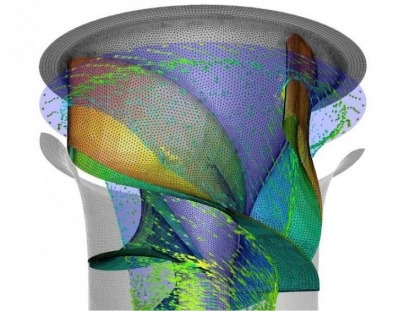
The Alden turbine is designed to provide for safer passage of downstream migrating fish, potentially minimizing or avoiding non-generating spill over dams, through-fish bypasses, and downstream fish passage facilities. The design may also provide additional options for generating capacity and recovery of energy lost in minimum flow releases.
“Recent engineering studies and scale model testing indicate this advanced design reduces fish mortality without sacrificing power conversion efficiency,” said Douglas Dixon, technical executive for EPRI’s Fish Protection Program. “Results show a turbine efficiency of near 94 percent and a predicted fish survival rate of 98 percent at full-scale at the project site.”
The DOE/DOI competitive solicitation resulted in the selection of 16 projects under 4 areas of hydropower research. The EPRI Alden turbine demonstration project falls under the Environmental Mitigation Technologies for Conventional Hydropower topic to develop hydropower technologies that will enhance environmental performance while increasing electricity generation, mitigating fish and habitat impacts and enhancing downstream water quality.
The EPRI project will deploy the Alden Turbine at the Brookfield Renewable Power School Street Project in Cohoes, New York with a proposed three-year installation and test plan to verify model test data and fish survival predictions. Demonstration of this technology could contribute to developing an additional 25,000 MW of untapped domestic hydropower capacity.
An independent, non-profit organization, EPRI brings together its scientists and engineers as well as experts from academia and industry to help address challenges in electricity, including reliability, efficiency, health, safety and the environment. EPRI’s members represent more than 90 percent of the electricity generated and delivered in the United States, and international participation extends to 40 countries.
For additional information:

